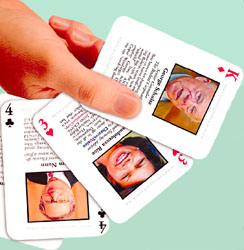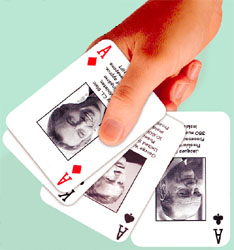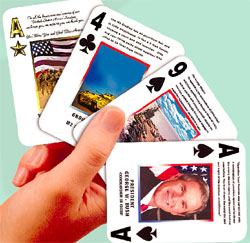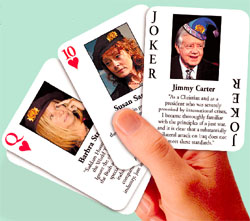|
|
|
 The U.S. government's
"Iraqi Most Wanted" cards have inspired politically charged
decks by Warprofiteers.com.
The U.S. government's
"Iraqi Most Wanted" cards have inspired politically charged
decks by Warprofiteers.com.
Sacramento Bee photo illustration/Susan
Ballenger | |
|
Stacking the deck
Popular spinoffs of the 'Iraqi Most Wanted' playing cards push
political agendas
By Will Evans -- Bee Staff Writer
Published 2:15 a.m. PDT
Tuesday, June 3, 2003
Playing "War" with a deck of cards just got
a little scarier.
The Paul Wolfowitz king of spades beats the Bill O'Reilly eight of
clubs. The Barbra Streisand queen of hearts beats the Fidel Castro three
of spades. And what happens when the George W. Bush ace of spades ties the
Jacques Chirac ace of clubs? "War" breaks out, of course.
These scenarios and more are all possible with spinoffs of the
government's "Iraqi Most Wanted" cards. The "Most Wanted" cards, designed
to help U.S. troops identify and capture Iraqi leaders -- Saddam Hussein
is the ace of spades -- have become familiar to the public, selling fast
on the Internet.
Now, various companies, organizations and Web sites are dealing out
politically charged decks of their own -- left-wing and right-wing,
pro-war and anti-war. Many of the decks, resembling regular playing cards,
can be purchased online at prices between $5 and $15. They're proba-bly
the most entertaining thing to come out of the war on Iraq.
But there's an edge to the fun and games.
For instance, the Ruckus Society, an Oakland activist organization,
turned the card tables on the U.S. government, replacing "most wanted"
Iraqis with a deck of "war profiteers." It points fingers at members of
the Bush administration and corporate executives alike for making money
off the conflict. President Bush is relegated to the joker card -- except
it's called "the Jerk."
"I get this delightful sense of justice to see these cards come out
because it's like a mirror to these power brokers -- to how they play the
world," says Craig Bond, 51, a Carmichael resident who picked up a deck at
a Ruckus Society gathering in Sacramento last weekend.
"It offers another perspective that hasn't been offered yet in the
media," says Daljit Baines, 30, of Natomas.
The cards are also an activist tool. The Web site that features them,
Warprofiteers.com, links to organizations that are
campaigning against the public figures.
On the other side, there's NewsMax.com. The conservative Web site produced a "Deck
of Weasels," ridiculing the "worst leaders and celebrities who opposed
America" -- and using their own quotes against them. Each is pictured
wearing an Iraqi Republican Guard-style beret. Jimmy Carter and Jesse
Jackson are the jokers. Susan Sarandon, who is also featured, told People
magazine: "I am elated to know there are enough people to make a full
deck."
The Florida-based company that makes the cards has sold more than
25,000 decks in the past few weeks.
"There's a lot of frustration in America toward Hollywood now," says
CEO Christopher Ruddy. "Now we're going to have the last laugh."
Still, Gopal Dayaneni, who worked on the Ruckus deck, finds humor in
the "Weasels" deck, too. He actually likes the quotes.
Take Martin Sheen: "By some demented form of logic, the men, women and
children of Iraq are relegated to 'collateral damage,' as the dogs of war
slouch toward Baghdad." A weasel to NewsMax, a wise man to Dayaneni.
In another shuffle, Bush replaces Hussein as the ace of spades in a
"Military Heroes" deck. GreatUSAflags.com, based in Illinois, has sold more than
1 million decks of heroes and other patriotic-themed cards in the past
five weeks.
Rick Podgorski of Grayslake, Ill., recently ordered the "Heroes" deck
to show his children those who should be honored for their service. The
family already has the "Most Wanted" cards, and each time an Iraqi figure
is killed or captured, the four kids, ages 3 to 8, take turns marking a
black "X" on the cards.
"To them, it's a tangible tie-in to what's going on in the world,"
Podgorski says in a phone interview.
Another way to get some hands-on action is to "play nuclear Armageddon
right in your own bunker."
So says a sarcastic Tom Clements, senior campaigner with Greenpeace
International, which created a knockoff deck depicting the nuclear powers
of the world -- including the United States and Britain. Other cards in
the deck have bits of info, such as the number of people who died in the
nuclear attacks on Japan (more than 200,000). You can even play solitaire
off of the Greenpeace.org Web site.
"It ties the anti-war message together with the disarmament message,"
Clements says.
And there are many, many more. Just go fish:
* A deck by anti-globalization Web site Gatt.org that features Vice President Dick Cheney as the
ace of spades and Bush as the four of clubs.
* A deck of "Republican Chickenhawks," featuring Republican politicians
who avoided military service.
* And a deck made by Republican lawmakers in Texas that pictures
Democratic legislators who recently fled the state temporarily to prevent
a bill from being passed. "Be sure to call the Department of Public Safety
if you see any of these jokers!" says the Web site featuring these cards.
In one deal or another, everyone gets carded. Bill Gates pops up as a
"Software Business Imperialist." Lynne Cheney draws the caption: "Uncle
Fester's wife."
And in the midst of the Washington, D.C.-meets-Las Vegas madness, the
original "Iraqi Most Wanted" cards, recently stocked at some Walgreens
stores, keep selling.
"This has been the most incredible playing card phenomenon, in terms of
the heat of the consumer interest ... that we have seen in our company's
135-year history," says George White, vice president of marketing for the
United States Playing Card Co., which manufactures the "Most Wanted" and
"Heroes" decks, as well as well-known brands such as Bicycle.
Cards and the military go way back.
During World War II, the company made special cards to help troops
distinguish among silhouettes of enemy and allied aircraft, White says.
Another deck had cards that would peel apart, revealing an escape route
out of Germany for U.S. prisoners of war. In the Vietnam War, soldiers
left aces of spades in villages and on corpses to scare the Vietnamese,
whom they believed to be superstitious of the image.
The history of cards and troops follows one simple truth: "When
soldiers are not performing their everyday regular duties, they tend to
play cards," says Sgt. Scott Boehmler, 27, one of five Defense
Intelligence Agency analysts who designed the "Most Wanted" cards. He says
the military might make an anti-terrorism deck next.
In the meantime, a few of the analysts ordered their own "Deck of
Weasels." Barbra Streisand won't be getting through the next checkpoint.
About the
Writer---------------------------
The Bee's Will Evans can
be reached at (916) 321-1987 or
wevans@sacbee.com.






